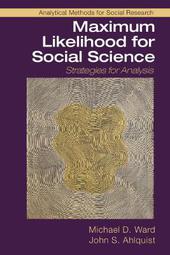
|
Maximum Likelihood for Social Science: Strategies for Analysis
Paperback / softback
Main Details
| Title |
Maximum Likelihood for Social Science: Strategies for Analysis
|
| Authors and Contributors |
By (author) Michael D. Ward
|
|
By (author) John S. Ahlquist
|
| Series | Analytical Methods for Social Research |
|---|
| Physical Properties |
| Format:Paperback / softback | | Pages:324 | | Dimensions(mm): Height 227,Width 152 |
|
| ISBN/Barcode |
9781316636824
|
| Classifications | Dewey:300.72 |
|---|
| Audience | | Professional & Vocational | |
|---|
| Illustrations |
Worked examples or Exercises; 43 Tables, black and white; 49 Line drawings, black and white
|
|
Publishing Details |
| Publisher |
Cambridge University Press
|
| Imprint |
Cambridge University Press
|
| Publication Date |
15 November 2018 |
| Publication Country |
United Kingdom
|
Description
This volume provides a practical introduction to the method of maximum likelihood as used in social science research. Ward and Ahlquist focus on applied computation in R and use real social science data from actual, published research. Unique among books at this level, it develops simulation-based tools for model evaluation and selection alongside statistical inference. The book covers standard models for categorical data as well as counts, duration data, and strategies for dealing with data missingness. By working through examples, math, and code, the authors build an understanding about the contexts in which maximum likelihood methods are useful and develop skills in translating mathematical statements into executable computer code. Readers will not only be taught to use likelihood-based tools and generate meaningful interpretations, but they will also acquire a solid foundation for continued study of more advanced statistical techniques.
Author Biography
Michael D. Ward is Professor Emeritus at Duke University, North Carolina. He has taught at Northwestern University, the University of Colorado, and the University of Washington. He worked as a principal research scientist at the Wissenschaftszentrum Berlin and held a Chaire Municipale at the University of Pierre Mendes France (Grenoble II). His work began with a study of the links between global and national inequalities, continued with seminal articles on the conflict processes in the Cold War, and more recently turned to analyses of networks of conflict and cooperation in the contemporary era. At Duke University, he established an innovative research lab of graduate and undergraduate students focusing on conflict prediction. One of the first political scientists to focus on the role of prediction in scholarly and policy work, he continues these efforts in his company, Predictive Heuristics, a data analytics firm that provides risk analysis for commercial and institutional clients. John S. Ahlquist is Associate Professor of Political Economy at University of California, San Diego's School of Global Policy and Strategy and a 2017-18 Fellow at Stanford's Center for Advanced Study in the Behavioral Sciences. He previously held faculty positions at the University of Wisconsin, Madison and Florida State University. His work has focused on the political structure and actions of labor unions, as well as the politics of redistribution and social insurance in a globalized economy. His methodological interests have spanned statistical models for network data; machine learning and cluster analysis; and the analysis of survey list experiments. He is author of over twenty journal articles appearing in a variety of outlets, including the American Journal of Political Science, American Political Science Review, the Journal of Politics, and Political Analysis. His most recent book (with Margaret Levi) is In the Interest of Others (2013). He is a past winner of a variety of prizes, including the Macur Olson Award, the Michael Wallerstein Award, and the APSA Labor Project Best Book Award. Ahlquist holds a Ph.D. from the University of Washington and a B.A. from University of California Berkeley.
Reviews'... offer[s] an excellent text with the goal to introduce social scientists to the maximum likelihood principle in a practical way.' M. Oromaner, Choice
|